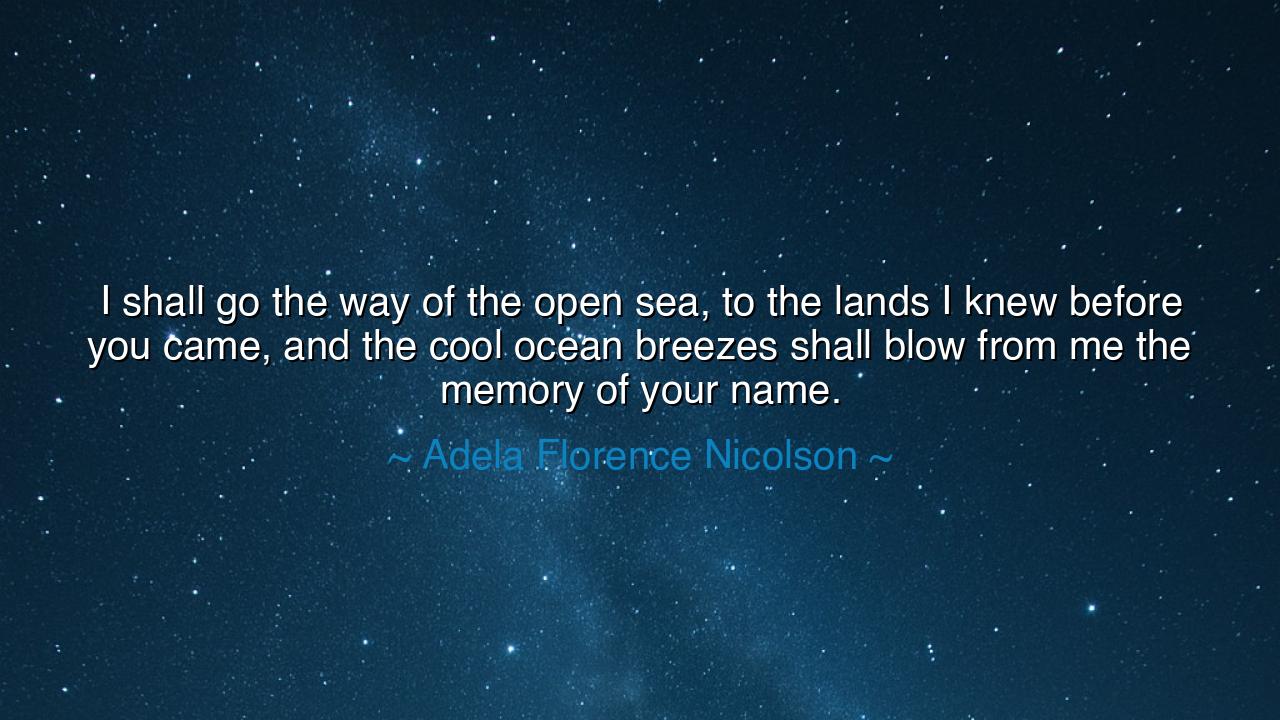
I shall go the way of the open sea, to the lands I knew before
I shall go the way of the open sea, to the lands I knew before you came, and the cool ocean breezes shall blow from me the memory of your name.






“I shall go the way of the open sea, to the lands I knew before you came, and the cool ocean breezes shall blow from me the memory of your name.” Thus wrote Adela Florence Nicolson, known to the world by her pen name Laurence Hope, a poet of longing and sorrow whose words carry the fragrance of love lost and freedom regained. In this verse, she speaks not only of parting, but of renewal, of the soul’s return to itself after the storm of passion has passed. Her words are the cry of a spirit seeking peace in the endless rhythm of the sea—the eternal symbol of release, healing, and rebirth.
Nicolson’s origin as a poet lies in the meeting of two worlds. Born in England but living in India during the height of empire, she was surrounded by the strange beauty of the East—its colors, its mysticism, its deep awareness of transience. Her poetry, steeped in both British melancholy and Indian sensuality, often speaks of love that burns too brightly, of emotions that both elevate and destroy. In this quote, she turns her face from the ashes of such love and toward the open sea—that ancient road of escape and transformation. For when the heart is weary, it seeks not vengeance, but distance; not more words, but the silence of the horizon.
The open sea in Nicolson’s verse is not merely a place—it is a state of being. It is the realm where the soul unbinds itself from memory, where the winds and waves wash clean the marks of sorrow. When she writes, “the cool ocean breezes shall blow from me the memory of your name,” she envisions not forgetfulness through bitterness, but through forgiveness and the passage of time. The sea, vast and indifferent, accepts all grief and dissolves it into its boundless depths. In its rhythm, she finds healing. In its freedom, she finds herself again.
The ancients often spoke of the sea as the mirror of the soul. To the Greeks, Odysseus journeyed upon it not only to reach his homeland, but to find wisdom through trial and separation. The sea tested him, purified him, and stripped away his illusions. So too, Nicolson’s “open sea” represents a voyage away from emotional captivity. She, like Odysseus, departs from the island of enchantment—a place of love, yes, but also of bondage—and sails once more toward the lands she knew before, to the self she was before love’s consuming fire. Her departure is not an act of cruelty, but of rebirth.
There is profound wisdom here for all who have loved and lost. To grieve deeply is human, but to remain chained to the memory of what cannot return is to wither. Nicolson’s verse teaches that healing comes not by clinging to the past, but by releasing it into the current of life. The ocean, with its tides eternal, reminds us that all things flow, all wounds close, and all names fade upon the wind. To go “the way of the open sea” is to trust that the soul will find new shores once it dares to leave the old behind.
Consider the story of Eleanor Roosevelt, who, after the betrayal and death of her husband, did not let sorrow consume her. Instead, she journeyed outward, devoting her life to human rights and compassion. Like Nicolson’s voyager, she turned pain into purpose, and the winds of the world carried her into new meaning. The ocean of life swept her from private heartbreak to public greatness. Such is the lesson of the sea: that beyond grief lies not emptiness, but expanse.
Therefore, dear listener, when love or loss casts you adrift, do not fear the open sea. Set your sails toward freedom, and let the winds carry away what was never meant to stay. The journey may be lonely at first, but the horizon always promises light. Remember Nicolson’s wisdom: that the heart, like the ocean, renews itself through movement. Do not anchor yourself to pain. Instead, let the cool breezes of time, of purpose, and of forgiveness cleanse you of sorrow’s weight.
For in the end, every soul must take this voyage—to leave behind the names that once burned upon its heart and rediscover the vastness of its own being. And when you stand upon that new shore, with the salt wind in your hair and the past behind you, you will know, as Nicolson knew, that the sea never truly takes—it gives back the self you had forgotten you were.






AAdministratorAdministrator
Welcome, honored guests. Please leave a comment, we will respond soon